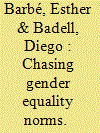|
|
|
Sort Order |
|
|
|
Items / Page
|
|
|
|
|
|
|
| Srl | Item |
| 1 |
ID:
191958


|
|
|
|
|
| Summary/Abstract |
This article studies Sexual and Reproductive Health and Rights (SRHR) at the United Nations (UN). SRHR, a gender equality norm that applies human rights to sexuality and reproduction, have traditionally been supported by a network of actors led by the United States (US) and the European Union. Nevertheless, a rival network has contested SRHR since their conception in the early 1990s. We study the robustness of SRHR in five UN fora between 2009 and 2020, focusing on actor constellations, productive power and norm concordance. Between 2009 and 2016, the normative status quo was maintained, except in the Human Rights Council and the Security Council. In 2017, the US joined the network of rivals and accelerated the norm’s weakening in the Security Council and the Commission on Population and Development. However, to weaken or strengthen the norm further, both networks see a need to address SRHR outside the UN.
|
|
|
|
|
|
|
|
|
|
|
|
|
|
|
|
| 2 |
ID:
164461


|
|
|
|
|
| Summary/Abstract |
Using the example of the right to self-defense under customary international law, we engage with questions concerning the linkage between norm robustness and legality. We draw out important differences between validity contestation and applicatory contestation within law. In so doing, we connect the international relations (IR) debate over norm robustness with our framework of interactional international law, bringing together constructivist insights into social normativity and a theory of international legality. We hypothesize that norms that meet the requirements of legality and are upheld by practices of legality enjoy “validity” and “facticity” (as defined by Deitelhoff and Zimmermann) and are “robust.” This model reveals that law operates through a continuing process of contestation. The requirements of legality impose a discipline, such that legal contestation will normally be applicatory contestation. Through practices of legality, therefore, legal norms can be maintained or shifted. However, legal norms may decay when practices of legality weaken or when challenges amount to validity contestation. The currently heightened contestation surrounding the circumstances under which the right to self-defense can be exercised against nonstate actors allows us to explore and illustrate of these dynamics.
|
|
|
|
|
|
|
|
|
|
|
|
|
|
|
|
| 3 |
ID:
164457


|
|
|
|
|
| Summary/Abstract |
The introduction develops this special issue's main research question: under which conditions are challenges to norms likely to decrease their robustness? The issue presents current research on contestation and norm robustness and discusses its limitations. We conceptualize a norm's robustness by examining both the practical and discursive dimensions. Robustness is high when norm addressees express widespread discursive acceptance of a norm's claims (validity) that also generally guide addressees’ actions (facticity). When normative claims are discursively rejected by most addressees and do not guide their actions, robustness is low. The contributions develop four broad indicators for measuring robustness (concordance, third-party reactions to norm violation, compliance, and implementation). The norms analyzed here were not easily eroded; despite direct challenges, they remained surprisingly robust. This indicates that norm robustness is not determined by the relative power of norm challengers, but rather types of contestation and structural factors. These include being embedded in larger normative structures, institutionalization, and legal character, although effects of these factors are more ambivalent than norm research has usually supposed.
|
|
|
|
|
|
|
|
|
|
|
|
|
|
|
|
| 4 |
ID:
171767


|
|
|
|
|
| Summary/Abstract |
Contestation of international norms has become the new focus of IR norm research. The optimism of the 1990s that fundamental liberal norms would diffuse globally has remained unfulfilled in recent years—even human rights norms have witnessed strong contestation. Time and again, controversy has erupted regarding international norms such as the ban on torture or the Responsibility to Protect. Meanwhile, we know little about how such controversy affects the robustness of norms—whether it contributes to their weakening or to their strengthening. Existing research offers two competing hypotheses: One branch of norm research often conceptualizes contestation as a sign of norm weakening. By contrast, another branch assigns contestation a normative power of its own, which strengthens norms. It does not specify the limits of such normative power, however. In this article, we argue that contestation per se is a poor predictor of norm robustness. The type of contestation a norm faces matters. Contestation can either (1) address the dimension of application of a norm or (2) examine its validity by questioning the righteousness of the claims a norm makes. The article draws on two illustrative case studies of extensively contested norms, the Responsibility to Protect and the ban on commercial whaling. We argue that widespread contestation of the very validity of a norm is likely to lead to a loss of norm robustness. Applicatory contestation, by contrast, can—under specific circumstances—even strengthen it.
|
|
|
|
|
|
|
|
|
|
|
|
|
|
|
|
|
|
|
|
|